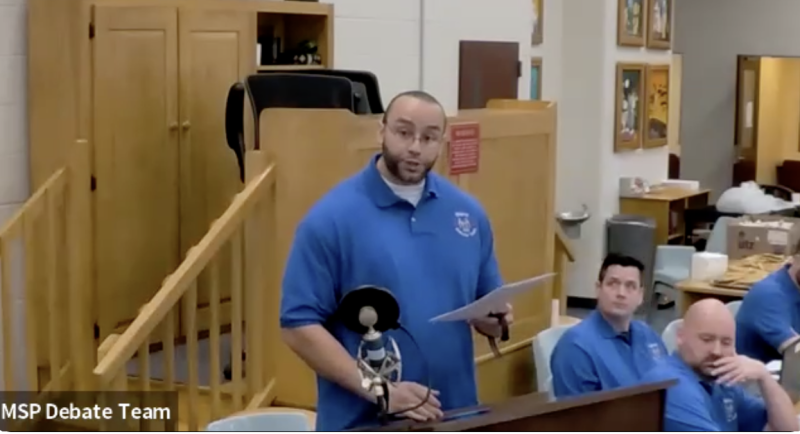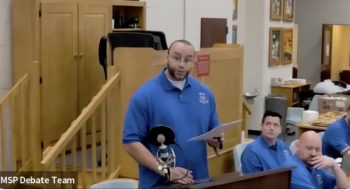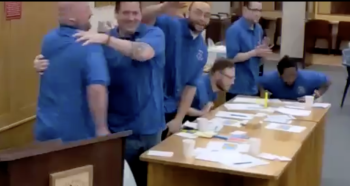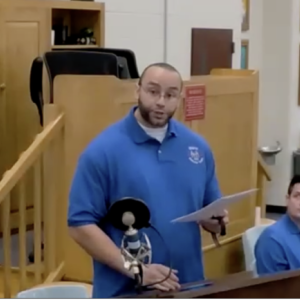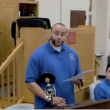Maine Prison Debate Team victorious against Wake Forest University, winning ‘hearts and minds’
For 90 minutes, intellectual electricity generated by a debate filled a room at the Maine State Prison in Warren. Requiring intense preparation and concentration on the part of 11 participants, their minds were razor-sharp. In the end, it was the Maine State Prison Debate Team that inched a victory over the formidable Wake Forest University Debate Team, a triple-crown winner in the circles of academic debate whose motto is, “think hard, talk fast. Yikes!”
“Not only did they prevail, they won hearts and mind,” said Daniel Throop, founder and executive director of the National Prison Debate League. “It wasn’t just an academic exercise.”
The topic was, “Should the United States abolish life without parole sentences?”
The mission of the National Prison Debate League, as stated at its website, “seeks to promote human potential and social diplomacy by creating safe educational spaces wherein a thoughtful exchange of ideas can increase knowledge, understanding, and community.”
The April 25 event was the last of three Spring 2023 debates. Earlier in April, the Maine team took on Boston College and Harvard, the topics respectively being: The US Federal Government Should Enact An Economy-Wide Carbon Tax, and the US Congress Should Enact The Paycheck Fairness Act.
Via Zoom, Throop introduced the April 25 spring finale debate, calling it, “a doozy.” Maine argued in the affirmative while Wake Forest argued against it.
The topic, “is a complex policy issue,” said Throop. The debate was, as moderator Clarence Williams said, ultimately a display of intellectual ability and social diplomacy.
Gathering in a room at the prison, with family in attendance, the Maine team consisted of incarcerated students from Maine State Prison and the Bolduc Correctional Facility, both in Warren. They included:
Leo Hylton, of Augusta, master of science in conflict analysis and resolution with a concentration in social justice advocacy and activism from George Mason University. He is from Augusta;
Matthew Cushing, who is pursuing a bachelor’s degree in mental health and human services, with a concentration in grief, trauma and loss. He is from Old Orchard Beach;
Steven Clark, a Ph.D candidate and certified recovery coach, from Southern Maine;
Chris Laliberte, a contemporary and popular music performance major through University of Maine at Augusta, from Richmond;
Shaun Libby, who holds a bachelor’s degree in the science of mental health and human services from the University of Maine at Augusta, and is currently pursuing a master’s degree in youth development through Michigan State. He is originally from Standish and has been incarcerated for 24 years; and
Abil Teshome, a critical thinker and team alternate.
Throop said that Libby is the Captain of the MSP/Bolduc team. The debate program was launched in Fall 2022 by the National Prison Debate League, and incorporates a 12-week training session. Prisoners apply to participate in the program, and their success at debate, “speaks to the intellectual capacity of incarcerated people.”
Hilton lead off for the Maine team, saying, “Before I begin, I’d just like to let you that each one of us has extensive debate experience since living in prison is a constant debate.”
Then the teams dove into aspects of the life-without-parole argument, touching on racism in the prison system, death sentences, effects on local, state and national economies, and the nature of hope.
Maine instituted life without parole in 1976. In 2022, the Legislature approved the work of a Commission to Examine Reestablishing Parole. A report was issued, and during the current 131st Legislative Session, LD 720, “An Act to Implement Certain Recommendations of the Commission to Examine Reestablishing Parole” was printed and referred to the Joint Committee on Judiciary. A hearing has yet to be scheduled on that bill.
While the Maine State Prison Team argued against life without parole, Wake Forest established its position that if the policy were defeated, there would be a correlating rise in the death penalty.
“We agree that life without parole is a sentence that is absolutely incredibly harsh and incredibly upsetting thing to experience,” said Wake Forest debater Nate Kruger. “The fact of the matter is, the death penalty is actively worse.”
The Wake Forest Debate Team included:
Niko Battle, international affairs and German major from Seattle, Washington;
Nate Kruger, a junior and psychology major from Brooklyn, New York;
Sebastian Cho, a philosophy major from Houston, Texas;
Marge Strong, who is pursuing a master’s in communication from Chicago, Illinois; and
Cole Wolfe, a sociology major with a minor in communication and statistics from Edmond, Oklahoma.
The Maine team cited prison statistics in the U.S., remarking on the sentencing of teens and young adults to life in prison, with no future but an existence in the correctional system. They explored the history of the prison system and recidivism.
They also spoke of the opportunities for making a constructive life outside of prison. One cited the efforts by Maine’s Dept. of Corrections to offer educational opportunities.
He said that he and another prisoner may be the first to pursue Ph.Ds, “from a prison setting, which is pretty awesome.”
He praised the warden, commissioner and program coordinators.
“Maybe it’s a touch of Stockholm syndrome, and that’s fine if it is, but it is the truth and the reality.... If the U.S. can follow the work that Maine is doing we are going to come up with a new collective consciousness and a new collective system that is about health and not about punishment.”
He spoke of his own 43-year sentence, and his work in prison as a tutor, studying for two associate degrees, two bachelor’s degrees, a master’s degree, and his current doctorate work, “to research technology and coaching ways that we can enhance spirituality and human connection.”
Wake Forest debaters argued for reform, citing correctional facilities resembling the Nordic prison system.
“Hope is constitutive to the human condition,” said Nate Kruger.
But Maine countered: “Life sentences without the possibility of parole are the antithesis of the Maine Dept. of Corrections’ mission statement of empowering change and restoring lives,” said one debater. “They are in direct contradiction to the Department of Corrections aim to rehabilitate the men and women incarcerated in its prison system.”
Another responded: “Long-term incarceration treats an offender as nonhuman as a creature whose life building capacity either does not exist or does not matter, and therefore is an impermissibly degrading form of punishment.”
As the clock ran down, the debaters delivered their closing statements. While waiting for the judges’ final point tally, Judge Priscilla Guerrero, a prosecutor who works with juveniles, complimented both debate teams.
“Your humanity and ability to be rehabilitated is always at the forefront of the work I do,” she said.
Chief Judge Ed Lee announced the winner, saying the debates are a testament to the existence of excellence in, “every corridor of our society.”
He said the debate was close, with almost a tie yet for one of the ballots holding a differential of .5 points.
“But, Maine received the majority of the ballots,” he said. “Congratulations to Maine for being victorious.”
Reach Editorial Director Lynda Clancy at lyndaclancy@penbaypilot.com

